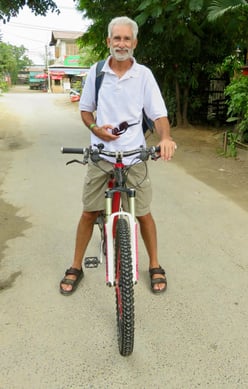What could you learn from a rich retiree who lives on $14,000 a year?


Martin Radebaugh wedged his right foot against a crack in the rock we were climbing.
He pushed hard with his leg.
That allowed him to bring each of his hands onto two separate rock surfaces, with his shoulders above his hands.
Martin hung in mid-air, supported by the strength of his upper body.
At that point, he pushed down and locked his arms. He then swung his legs onto the flat rock to his right, before standing up.
I was impressed by his strength. I was also surprised to learn that this 70-year-old retiree lives on less than USD 14,000 a year. In 2023, he spent $13,800. That included two trips from his home in Panama to Costa Rica.
Do you think he’s broke…a guy who moved to Central America to dodge living in a trailer park?
That couldn’t be further from the truth. Martin is rich.

So how do I define “rich?”
For starters, someone is not rich if they earn $1 million a year, drive a Ferrari, or fly first class to luxury resorts every year, but they must work to live.
In sharp contrast, someone is rich if they could indefinitely spend at least twice the median income of the region they live, without having to work. That describes Martin.
Martin, who worked as a healthcare professional in the US and Saudi Arabia, has a solid investment portfolio. He could withdraw an inflation-adjusted 4 percent per year. But he continues to let it grow. “I even still add regular money to it,” he laughs. “It just became a habit.”
He earns a monthly pension from his career as a healthcare worker. And recently, he began to collect his monthly Social Security payments from the US government.
“What do you do with that money?” I asked.
“I give it away,” he replied. Echoing Walter Matthau, he said, “Money is like fertiliser. You have to spread it around to make things grow.”
You might wonder why he doesn’t just spend his money and enjoy it.
It’s a fair question. However, research suggests we boost our life satisfaction (even our health) when we donate money and help other people. What’s more, most of the stuff we buy doesn’t make us happy…even if we think it might.
Martin doesn’t buy what he doesn’t need.
As a savvy global traveller, he has visited 115 countries. Now living in Boquete, Panama, he rents a modest, self-contained unit behind someone’s home for $350 per month. He exercises daily and joins a social hiking group three times a week. After every hike, he and his friends get together for lunch at a local café. Every Sunday, he volunteers his time picking up trash with a group that calls themselves the Basura Busters (Basura is Spanish for trash).
Martin also still loves to travel.
You don’t have to spend as little as Martin. Even in Boquete, most people spend much more.
But if you want to harness your life force, someone like Martin could be Yoda.
“I’ve never gained pleasure from material things,” he says.
You might immediately think, “I’m nothing like that guy. I like new cars. I love my beautifully decorated house. I’m also happier with my $15,000 racing bike, compared to the $8,000 bike I had last year."
But the truth is, you’re more like Martin than you might think.
New or expensive stuff rarely makes us happier because we adapt to what we own. For example, Michigan State University’s Norbert Schwartz found that those who drive expensive cars believed they enjoy their driving experiences more than people who drive inexpensive cars. But they were wrong in their assumption.
This might not stop the average Toyota driver from pining for a Porsche. But the initial high from owning a high-end car has the longevity of a dragonfly. Hedonic adaptability sees to that.
It’s easy to say, “That wouldn’t or doesn’t happen to me.” However, if you’re a carbon-based life form, it almost always does.
Researchers Emily G. Solberg, Edward Diener and Michael D. Robinson published findings in the American Psychological Foundation: “Why Are Materialists Less Satisfied?” They found that the drive for more and better “stuff” figuratively makes us laugh a lot less. That’s because we often think that if we buy something special, that will make us happy. But typically, it doesn’t. Instead, it often puts us on a treadmill of consumption. And if everyone we know is on the same hamster track, it becomes invisible beneath our feet.
Reams of other studies lead to the same conclusion.
Our quest for better “stuff” might explain why extremely high-income people aren’t as happy as we might think. For example, in a Gallup World Poll of more than 1.7 million people worldwide, researchers found that life satisfaction increased with income…up to a certain level. But far beyond that point, life satisfaction trended down. (That tipping point was different for every global region. But it was prevalent everywhere).
Researchers believe that as we make more money, we often pine for and acquire more “stuff.”
But that doesn’t have to happen. You could earn millions a year and still be happy…if you channel Martin Radebaugh. He laughs when I say this. But his life is a template for satisfaction, based on psychological research.
Here are seven research-based components that could help you maximise your life.
- Don’t upgrade what you own if your things are functioning well. Ignore what Mr. and Mrs. Jones bring home.
- Don’t buy what you don’t need. You’ll save money and it will help the environment. Most of us are on an invisible consumption treadmill.
- Exercise daily. If possible, do it with your friends.
- Socialise with family and friends, ideally, several times a week.
- Donate your time and money to worthy causes. If possible, try to ensure that you can witness the benefits.
- Regularly invest your money. If you won’t need it, someone else in the future might.
- Spend money on experiences, not stuff.
My book, Balance, includes several primary sources that support those principles. Another book on a similar theme came from Harvard University’s Michael Norton and the University of British Columbia’s Elizabeth Dunn. They wrote Happy Money: The New Science of Smart Spending.
I doubt Martin Radebaugh read those books.
He just knows, intuitively, how to live well.
“Being rich,” he says, “is feeling that you have more than you need. It’s not a particular amount of money.”
Andrew Hallam is the best-selling author of Millionaire Expat (3rd edition), Balance, and Millionaire Teacher.

